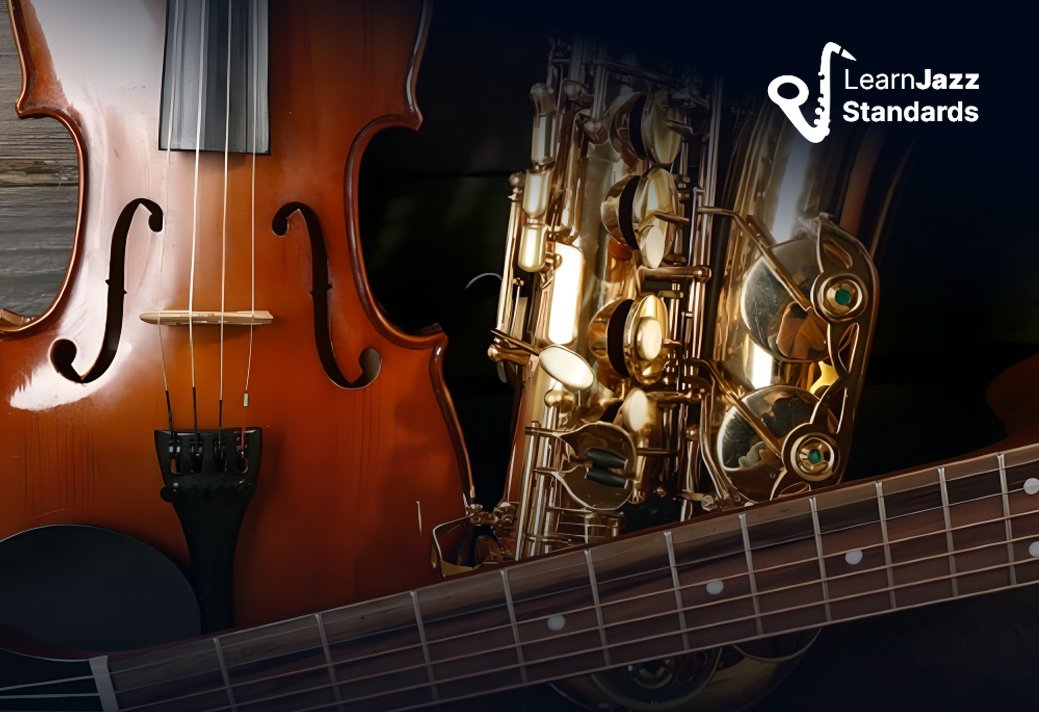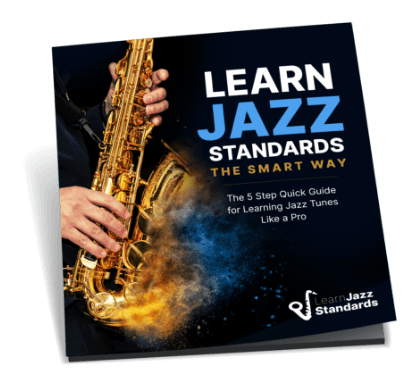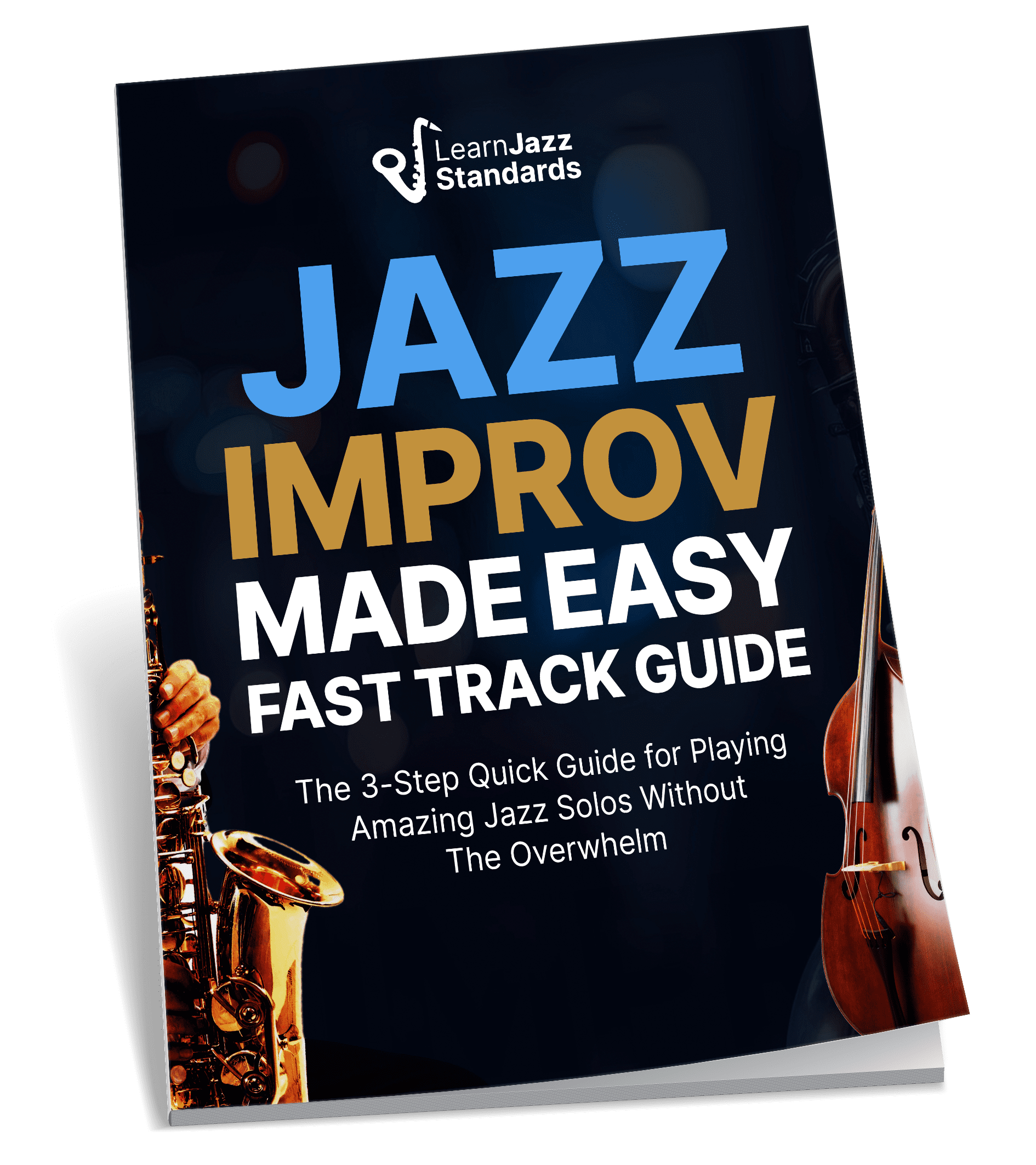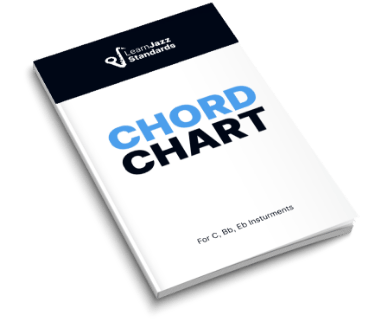If you want to play Bossa Nova music, you must know some Bossa Nova chord progressions!
However, Bossa Nova music is way more than harmony! To get a feel for Bossa Nova and Brazilian music generally, you’ll need to learn about Brazil’s rich rhythmic tradition and the key composers who fused jazz harmony with traditional Brazilian rhythms and attitude.
In this article, we’ll explore the tradition of Bossa Nova music and discuss eight important Bossa Nova chord progressions you must know, especially if you are trying to improve your jazz guitar playing!
We’ll look at—
- The history of Bossa Nova and the Bossa Nova groove
- Important Bossa Nova composers
- Musical elements of Bossa Nova
- Bossa Nova guitar patterns
- And six Bossa Nova chord progressions you need to know!
But, before we get started with Bossa Nova chord progressions and the history of the genre…
If you aren’t progressing in the practice room but want to take your jazz playing to the next level, check out the Learn Jazz Standards Inner Circle! The Inner Circle has everything you need to seriously improve your jazz chops.
Improve in 30 Days or Less. Find out how!
Table of Contents
Bossa Nova Music: A (Brief) History
Bossa Nova is a unique music style that blends jazz harmony and traditional Brazilian rhythms. It emerged from Brazil in the late 1950s and early 1960s, and after its emergence, it took the jazz world by storm.
In fact (as you probably already know), Bossa Nova songs make up a significant part of the body of jazz standards.
However, it wasn’t always that way.
Bossa Nova means “new wave” or “new style,” and the music certainly fit that bill back when the soundtrack to the movie “Orpheu Negro” (Black Orpheus) was released in 1959. This movie, a Brazilian twist on the Greek classic Orpheus and Eurydice, featured Bossa Nova prominently alongside the traditional music of the Brazillian Carnival.
Bossa Nova was revolutionary in Brazilian culture.
These young New Wave composers modernized traditional Samba by fusing it with modern jazz harmony. Bossa Nova music is also unique in that it features the nylon string classical guitar as the main chordal instrument, which contributes to its smooth, unique sound.
Let’s learn a bit about these revolutionary Bossa Nova composers.
Key Bossa Nova Composers
- Antônio Carlos Jobim: Often referred to as the father of bossa nova, Jobim’s compositions, such as “The Girl from Ipanema,” “Desafinado,” and “Waters of March,” have become iconic jazz standards. Jobim internationalized Bossa Nova music by working alongside American jazz greats like Frank Sinatra and Stan Getz.
- João Gilberto: Known for his innovative guitar style and soothing vocals, Gilberto pioneered the bossa nova movement. He adapted samba rhythms for guitar and set the longstanding precedent of soft and smooth vocal performances in Bossa Nova music.
- Vinicius de Moraes: Vinicius de Moraes collaborated extensively with Jobim and wrote many of the lyrics for many Bossa Nova songs, including “The Girl from Ipanema” and “Chega de Saudade.”
- Luiz Bonfá: With his sophisticated guitar skills and rich compositions, Luiz Bonfá substantially contributed to the popularization and evolution of bossa nova. He is best known for his work on the soundtrack of the film mentioned earlier, Orpheu Negro, which introduced many people around the world to Brazilian music.
Bossa Rhythm and the Elements of The Bossa Nova Style
Joao Gilberto’s influence on Bossa Nova guitar (and jazz guitar by default) was very important. Gilberto introduced a syncopated style of chord comping where the technique was rooted in classical guitar, but the rhythms were from Samba.
In this style, the thumb plays the bass note, emphasizing the 1 and the 3, while the other fingers play syncopated chords. There are various ways to do this, but here are a few examples. Note that the bass notes are always played on 1 and 3. The rhythmic slashes are the upper voices in the chord.



Because of the emphasis on beats one and three in the bass, you can also feel Bossa Nova in 2/4 rather than 4/4.
Important Bossa Nova Chords
As we learned above, Bossa Nova music began on the classical guitar, which was a common instrument in Brazil. Below, I’ve compiled common Bossa Nova guitar chord voicings (and provided their shapes on the piano).
The following bossa nova guitar chords are commonly used to comp bossa nova chord progressions on the guitar:
- Major 6/9 Chords
- Minor 9 Chords
- Dominant #11 Chords
6/9 Major Chords
[A-D-G-B String] C 6/9 Chord:
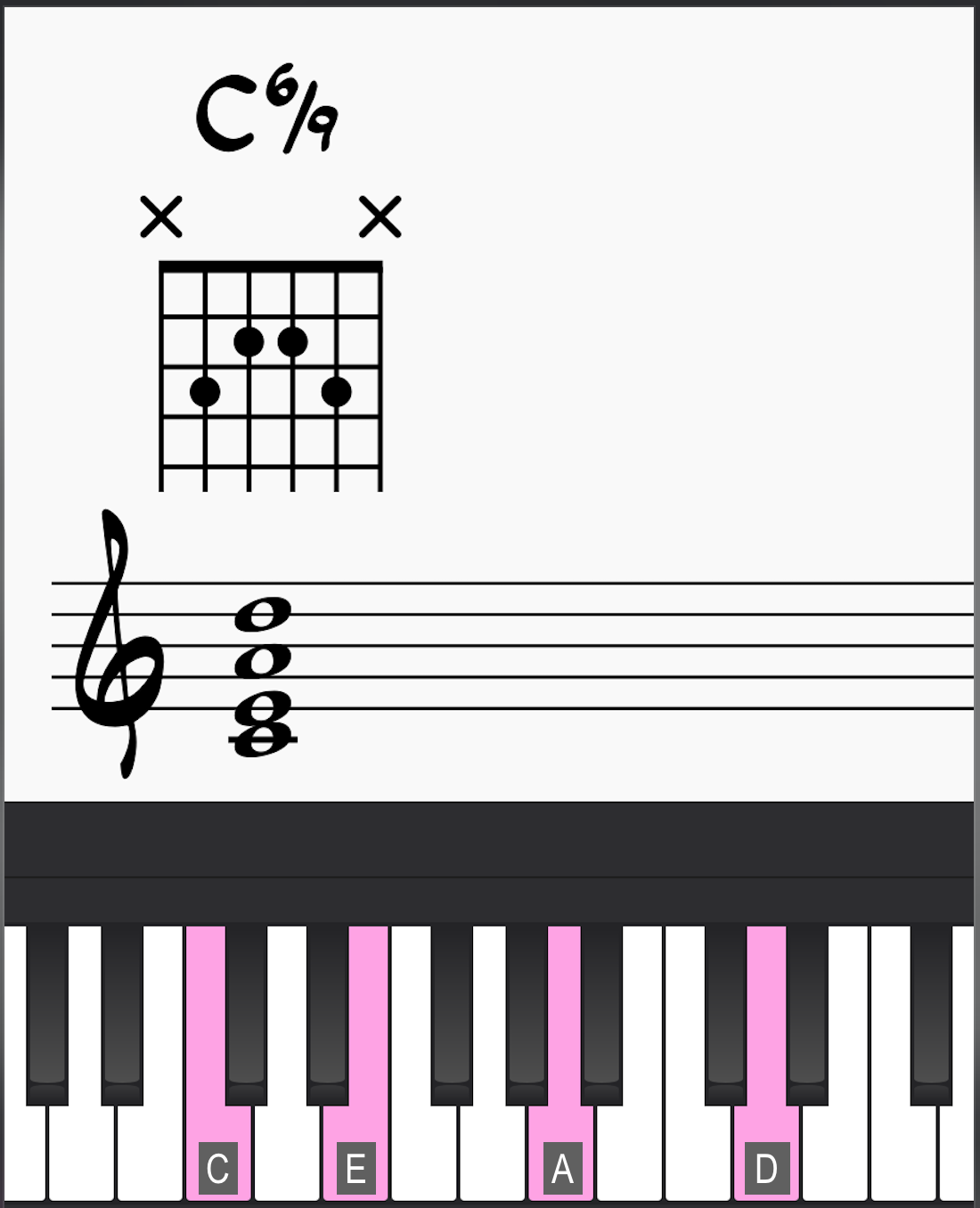
[E-D-G-B String] G 6/9 Chord:
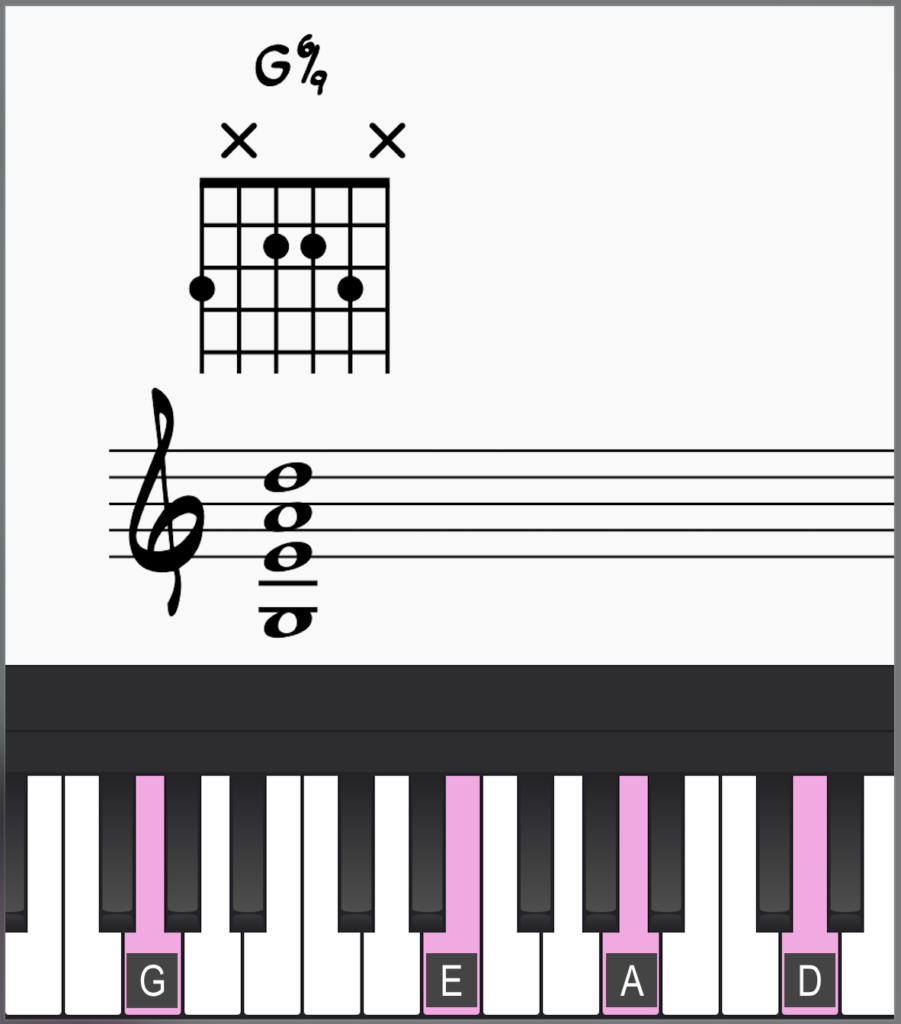
Minor 9 Chords
[A-D-G-B String] C Minor 9 Chord:
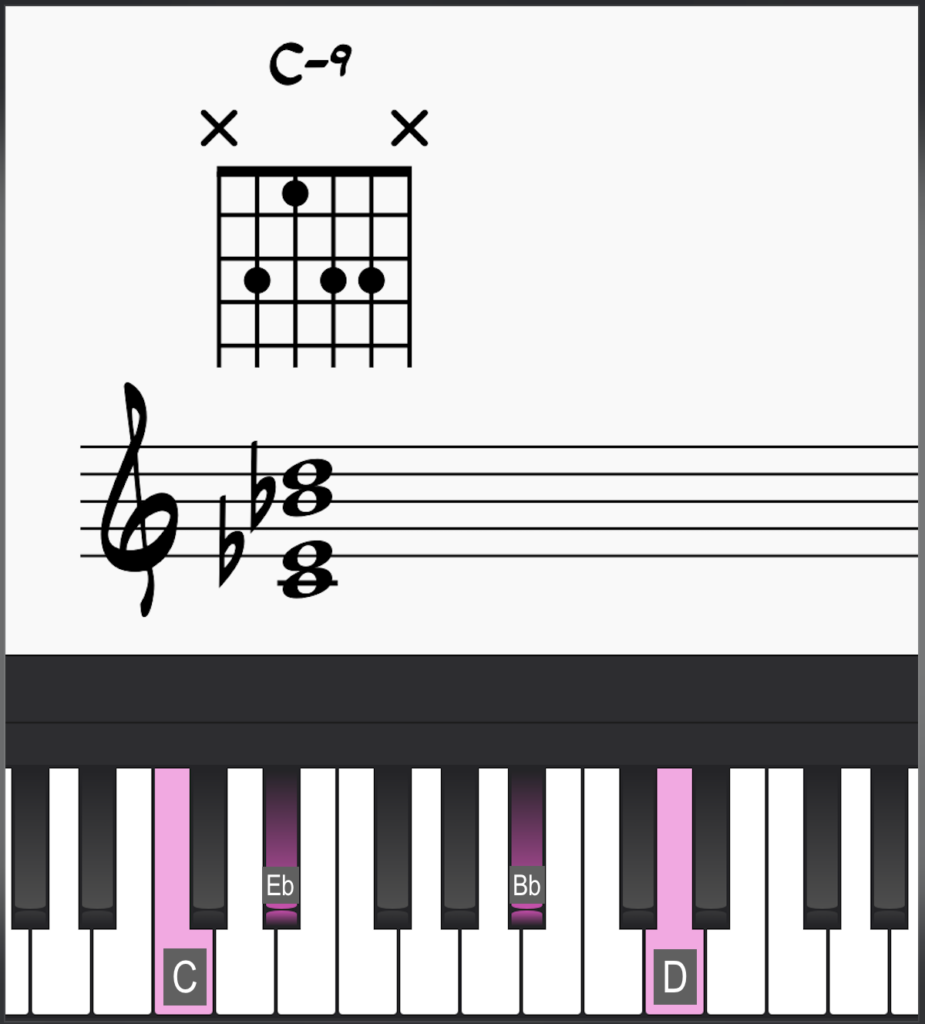
[E-A-D-G String] G Minor 9 Chord:
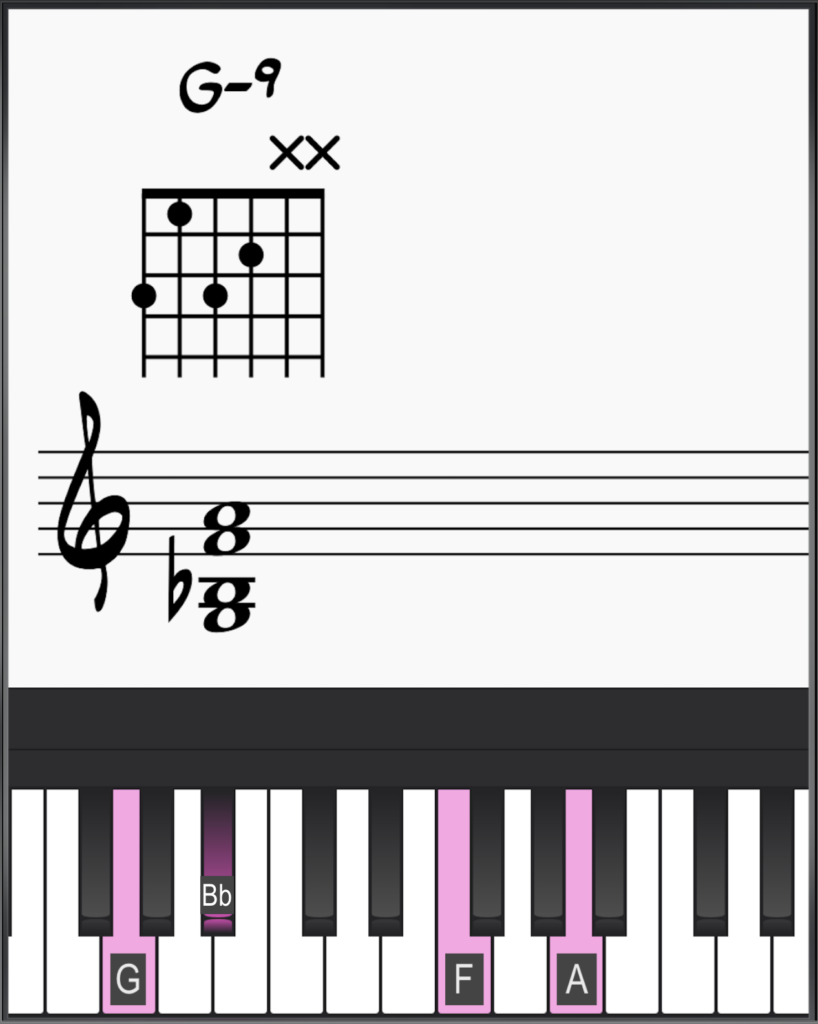
Dominant #11 Chords
[A-D-G-B-E String] C7#11 Chord:
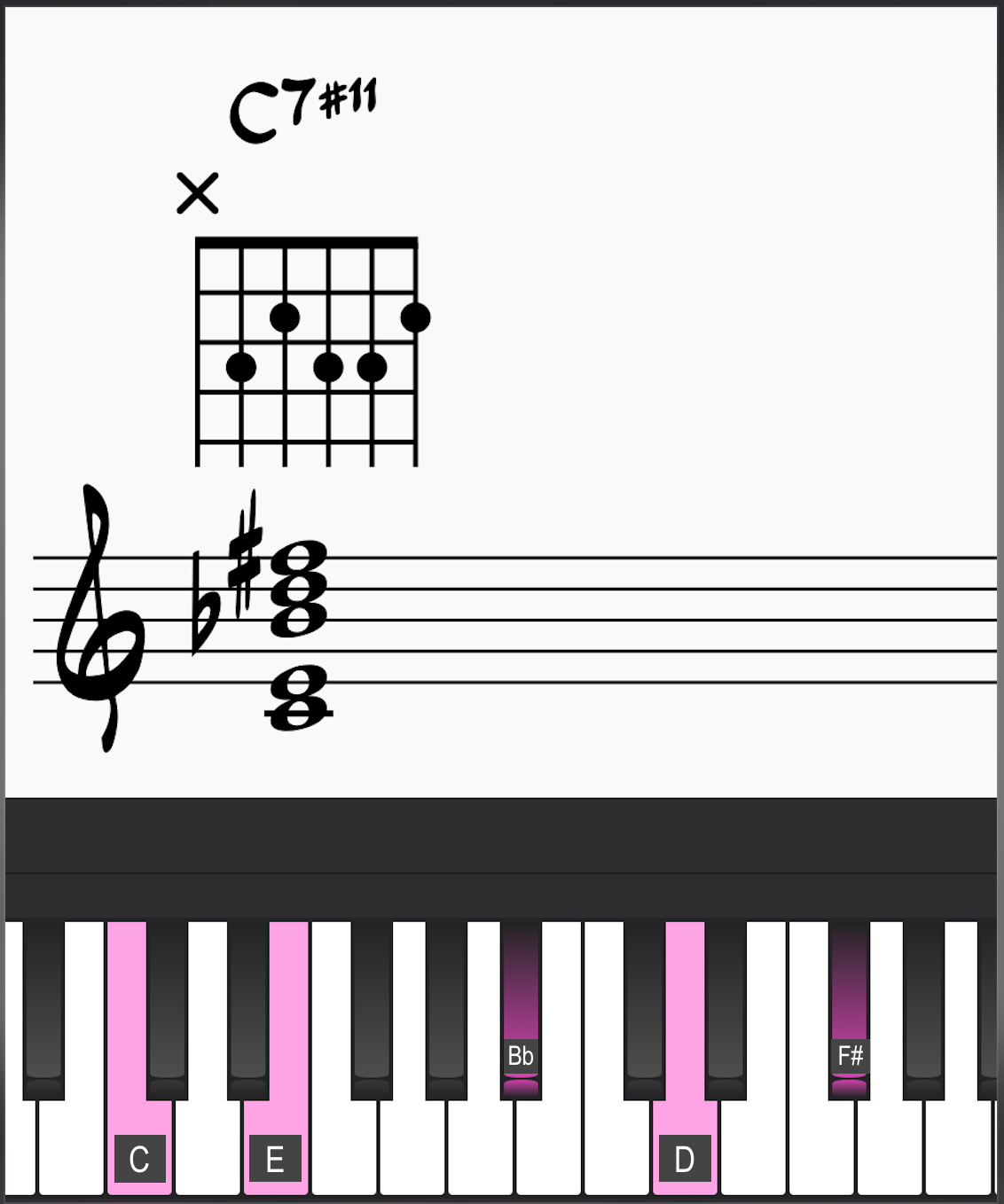
[E-D-G-B String] G7#11 chord:
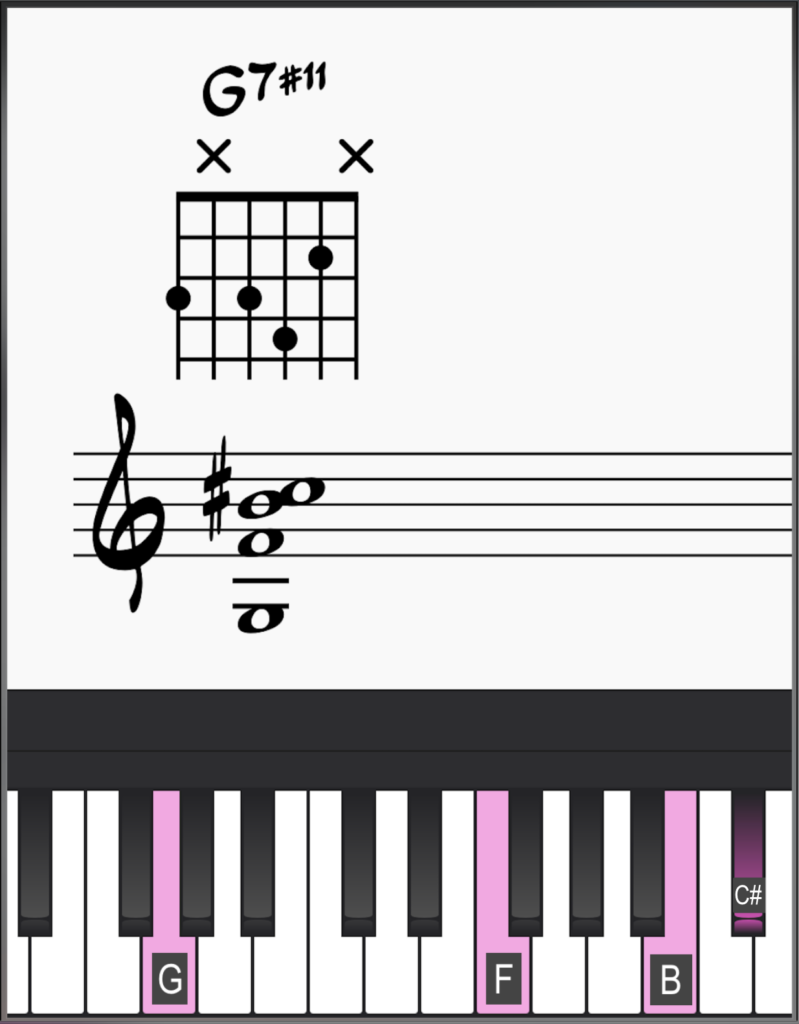
For more jazz guitar chords, check out these 20 jazz guitar chords you need to know.
BEFORE YOU CONTINUE...
If music theory has always seemed confusing to you and you wish someone would make it feel simple, our free guide will help you unlock jazz theory secrets.
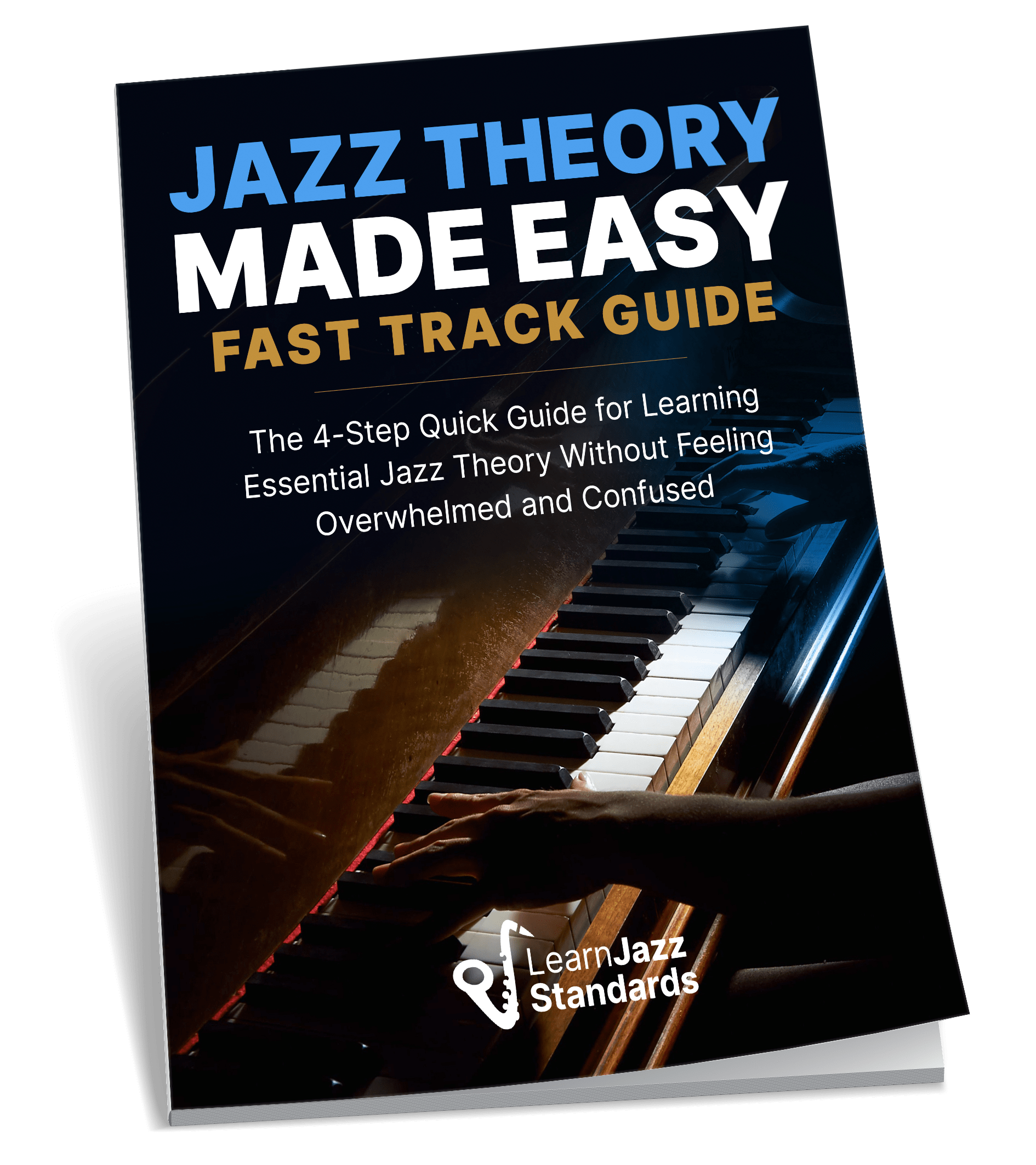
6 Bossa Nova Chord Progressions and Why They Are Great
Now it’s time to dig into eight bossa nova chord progressions and discover why they are so influential in jazz music.
1. Manha De Carnaval (Black Orpheus)
This is the bossa tune that started it all, so we need to discuss it! This was composed by Luiz Bonfá, who we talked about above. His soundtrack for the movie Orpheu Negro (Black Orpheus) was the spark that started the Bossa Nova craze.
Compared to the other Bossa Nova chord progressions on this list, this tune is fairly simple. It is mostly constructed of minor ii-Vs and major ii-Vs in the relative major and minor keys of C major and A minor.
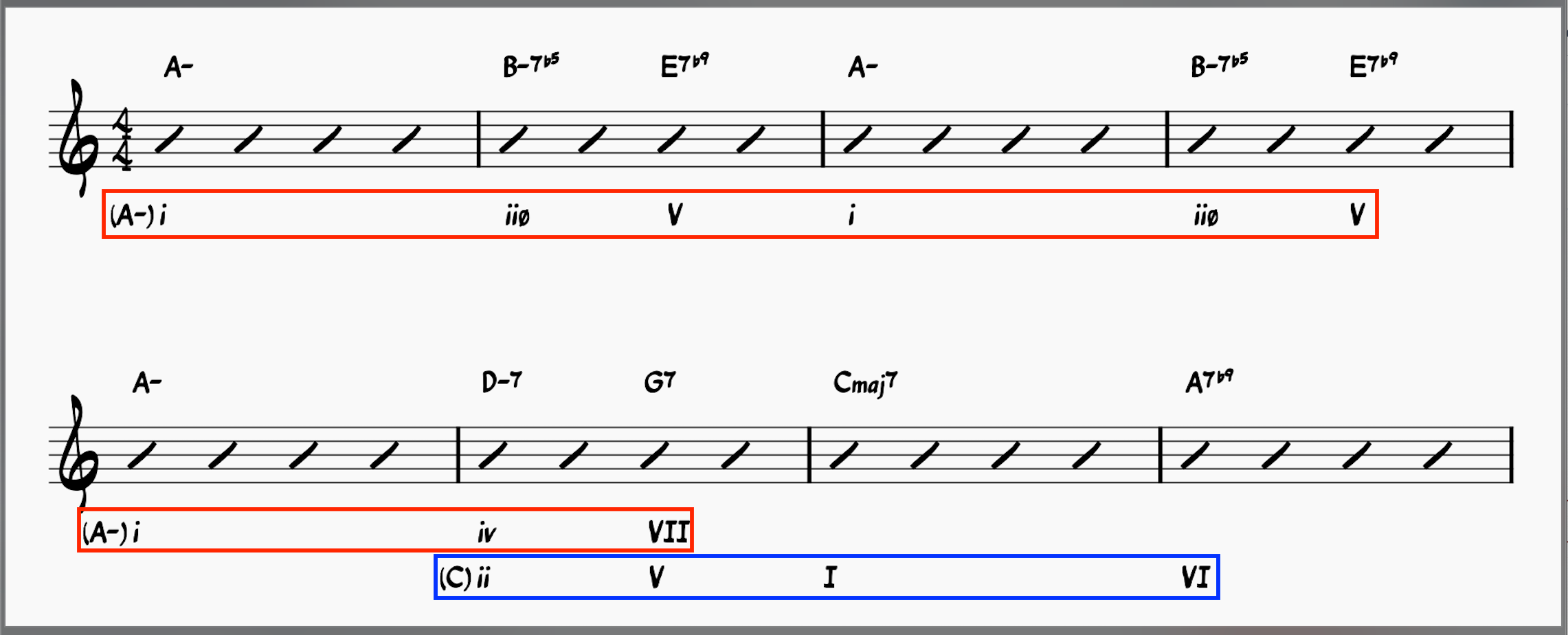
Here are bars 9 -16 of Manha De Carnaval:
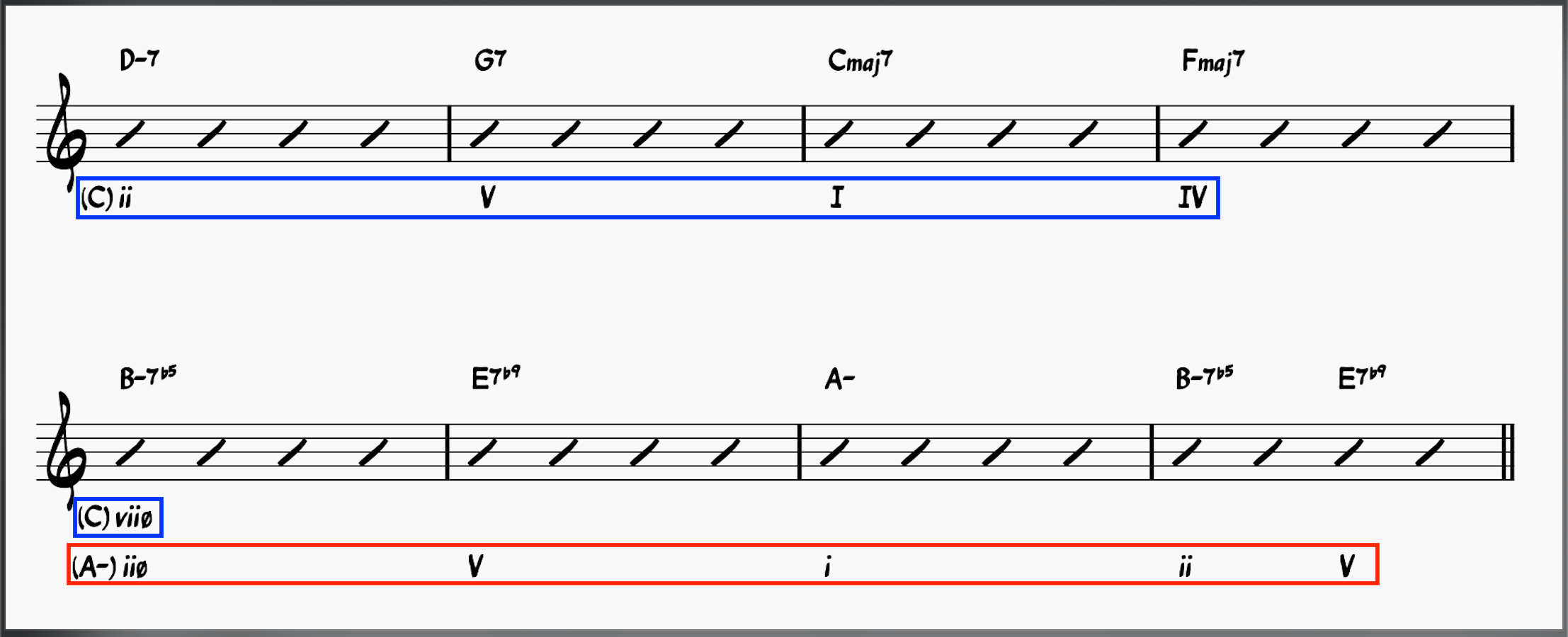
This is the most simple of the Bossa Nova chord progressions on this list, but it’s an important one because of its history. Things are about to get more intricate with the other Bossa Nova tunes on this list.
For more on parallel major and minor keys, check out this article.
Check out this version of Manha De Carnaval by Wayne Shorter:
2. Corcovado (Quiet Nights of Quiet Stars)
Corcovado is a Jobim classic that has some cool harmonic complexity.
It starts on an A-6, giving it some ambiguity with its relative major (C major, specifically, an inverted Cmaj6 chord). However, the presence of the F# hints at an A Dorian sound or G major tonality.
Let’s consider the tune in A-, but I wanted to comment on the ambiguity. After establishing the tonal center, the progression goes to a dominant functioning diminished chord—and Ab diminished (or E7b9).
The Ab diminished chord shares many common chord tones with an E7b9 chord, so they both essentially function the same way:
Ab Diminished:
- bb7th: Gbb (or F)
- b5th: Ebb (or D)
- m3rd: Cb (or B)
- Root: Ab (or G#)
E7b9 (with no E):
- 7th: D (or Ebb)
- 5th: B (or Cb)
- 3rd: G# (or Ab)
- b9: F (or Gbb)

After this, we move to a standard ii-V-I progression in the key of F, but we delay the resolution of the I by first playing a Idim chord.
Backdoor Progression and Dominant II in Bars 9-16

In bars 9 and 10, we borrow from the parallel minor (C minor if we look at this tune as being in the key of C major) with a classic backdoor ii-V progression.
In the Key of C minor, the vi chord is an F minor chord, and the VII chord is a Bb major chord. Using these chords in our progression, we use modal interchange chords to resolve to the I. However, instead of resolving to C major, we resolve to E-7 (which is basically a rootless Cmaj7 chord, so it counts!).
After this, we use another borrowed chord to play a dominant II (D7 borrowed from C Lydian or G major again) before playing a regular ii-V back to “C,” or rather, to our inverted A-6 chord.
For more on borrowed harmony, check out our article on modal interchange.
Check out this version of Corcovado:
3. Garota De Ipanema (Girl From Ipanema)
Perhaps the most famous of the Bossa Nova chord progressions on this list is Girl From Ipanema. This iconic jazz standard makes use of two important jazz harmony devices:
- the Dominant II
- the Tritone Sub
Both are evident in the A section of the tune:
The Dominant II
The dominant II chord is an example of a borrowed chord where we pull a chord from D Melodic Minor or Fmajor7#5. Normally, in the key of F, the ii chord is a minor chord. However, by making this dominant with a #11, we are pulling from the third mode of D melodic minor: F Lydian Augmented.
That makes the G7#11 chord a G Lydian Dominant sound, which happens to be the scale you can use over this chord.
For more on melodic minor, check out our guide to the modes of the melodic minor scale.
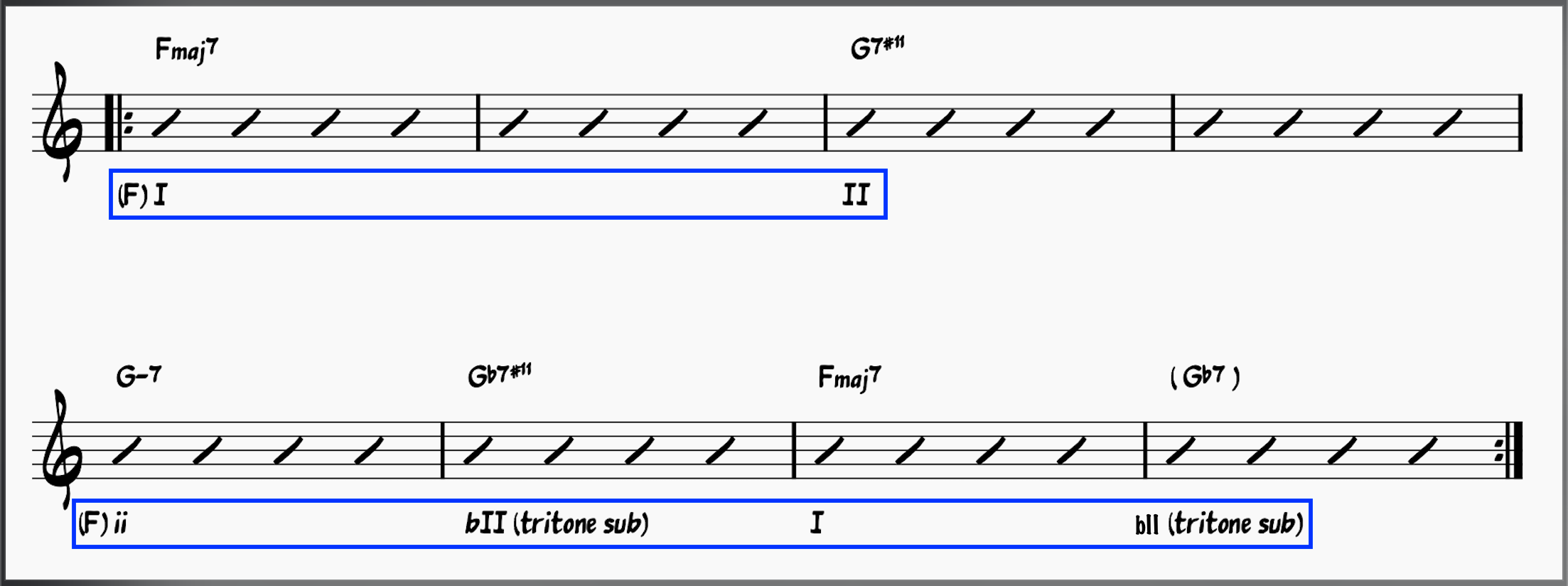
The Tritone Sub
Instead of a traditional ii-V-I, Jobim uses a tritone sub of the V chord, creating a chromatic line in the bass note and a smooth resolution to the I chord.
He chooses a Gb7 instead of a C7 Chord
The V and the bII share the same guide tones:
C7
- 7th: Bb
- 5th: G
- 3rd: E (or Fb)
- Root: C
Gb7
- 7th: Fb (or E)
- 5th: Db
- 3rd: Bb
- Root: Gb
The Bridge of Girl From Ipanema
The B Section, or Bridge of Girl From Ipanema, is also harmonically interesting.
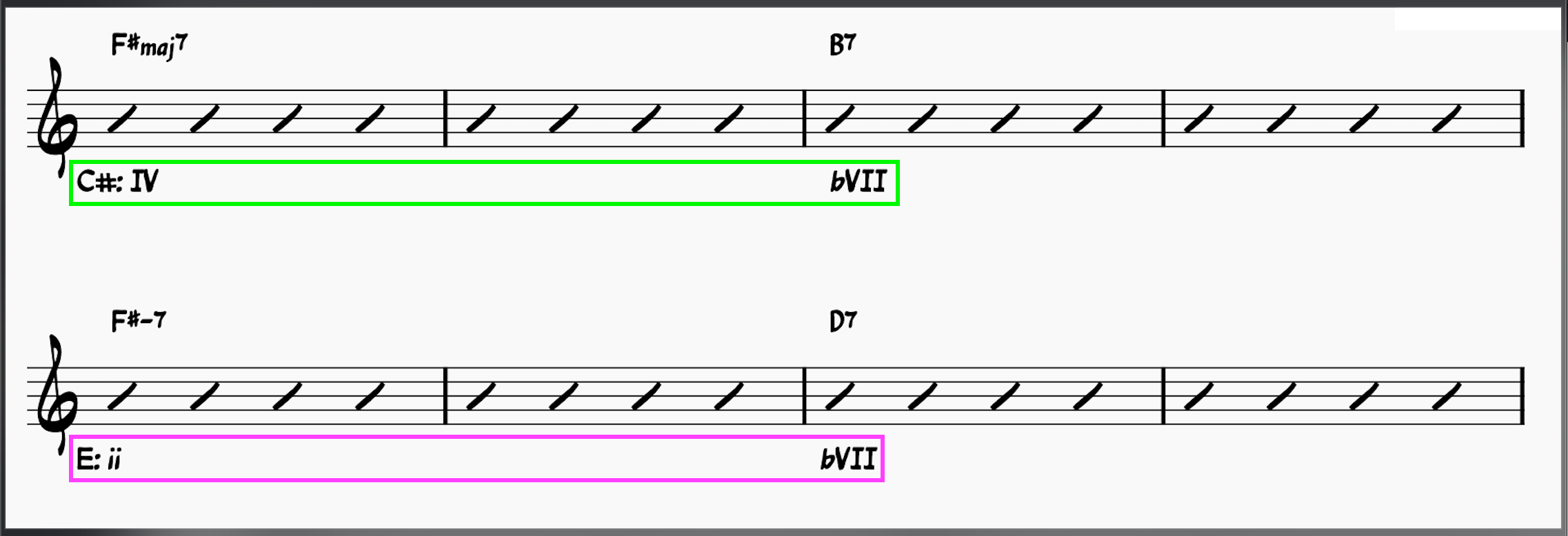
Nearly the entire bridge is made of IV – bVII chord progressions or ii – bVII chord progressions that never resolve to the I chord:
- F#maj7 to B7 (Key of C#) or VI – bVII
- F#-7 to D7 (Key of E) or ii – bVII
- G-7 to Eb7 (Key of F) or ii – bVII
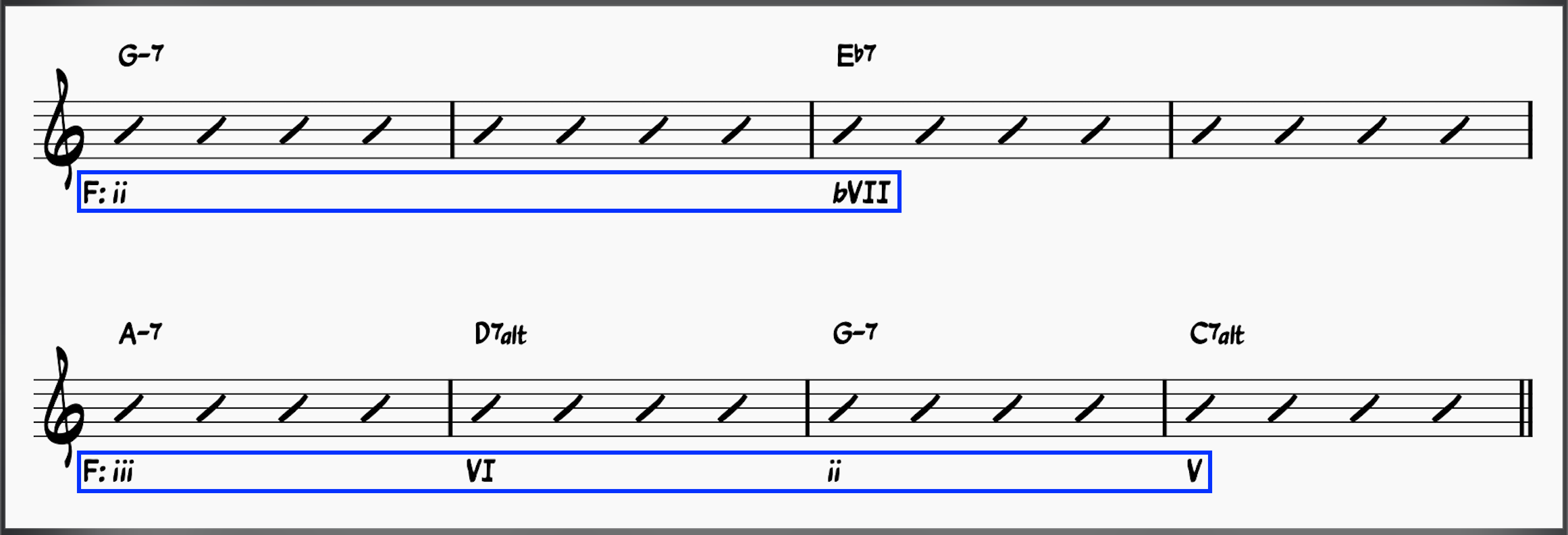
The last system of the tune is a classic iii-VI-iiV chord progression.
Check out this recording of Girl From Ipanema:
4. Samba de uma Nota Só (One Note Samba)
One-note Samba uses some great bossa nova guitar chords in the A section. The key is Bb, and this bossa nova chord progression features a twist on the classic iii-VI-ii-V chord progression.
Instead of iii-VI-ii-V, Jobim chooses to use tritone subs for the VI and V chords:
- Instead of G7, he uses a Db7 chord
- Instead of F7, he uses a B7#11 chord

This use of tritone subs creates a line of descending chromatic bass notes, which sit nicely on the guitar. Here are some useful Bossa Nova guitar chords with a common Bossa Nova rhythm to try playing over these changes:

Notice how these particular Bossa Nova guitar chords have strong chromatic voice leading. These voicings lend themselves well to the Bossa Nove style.
Check out this version of One Note Samba by Astrud Gilberto:
5. Dindi
Dindi is another great example of Jobim’s music and its influence on jazz music as a whole. The A section is in Eb but borrows a chord from the Eb Dorian—Db. This interplay between Eb and Db major adds to its mysterious and haunting melody.
With a ii – V (Bb-7 – Eb7), the tune moves to the IV chord before hitting the characteristic minor [iv – I].
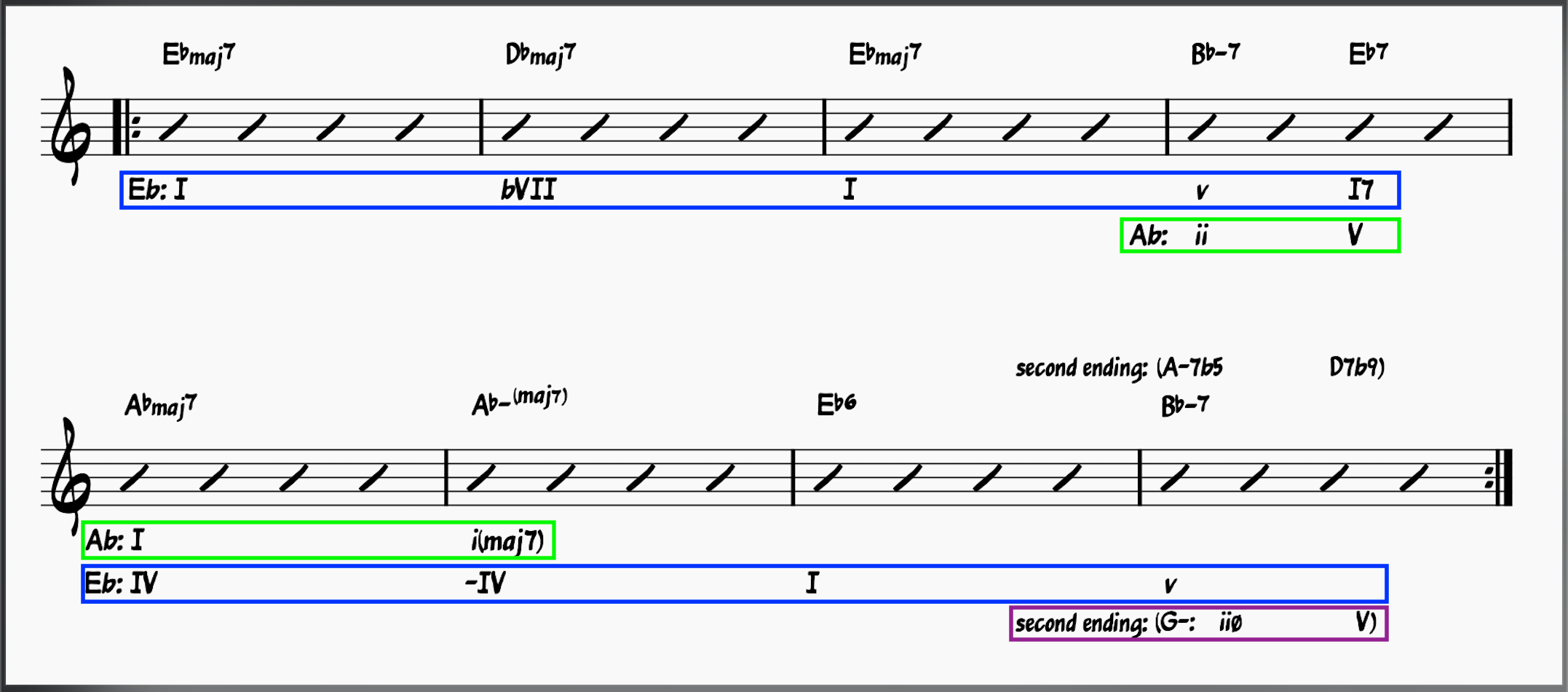
However, the B section makes this Bossa Nova chord progression so unique. Jobim finds a unique alternative to a V chord in a minor i-V progression.
Instead of [G- D7], Jobim chooses an Eb-6 chord, which contains the same guide tones as a D7 chord.
D7
- Root note: D
- 3rd: F# (Gb)
- 5th: A
- 7th: C
Eb-6
- Root: Eb
- 3rd: Gb (F#)
- 5th: Bb
- 6th: C
Therefore, the dominant function is still present, yet the color is more ominous and mysterious. Jobim uses this alternative chord in the key of G- and also in the key of F- in the second half of the bridge.
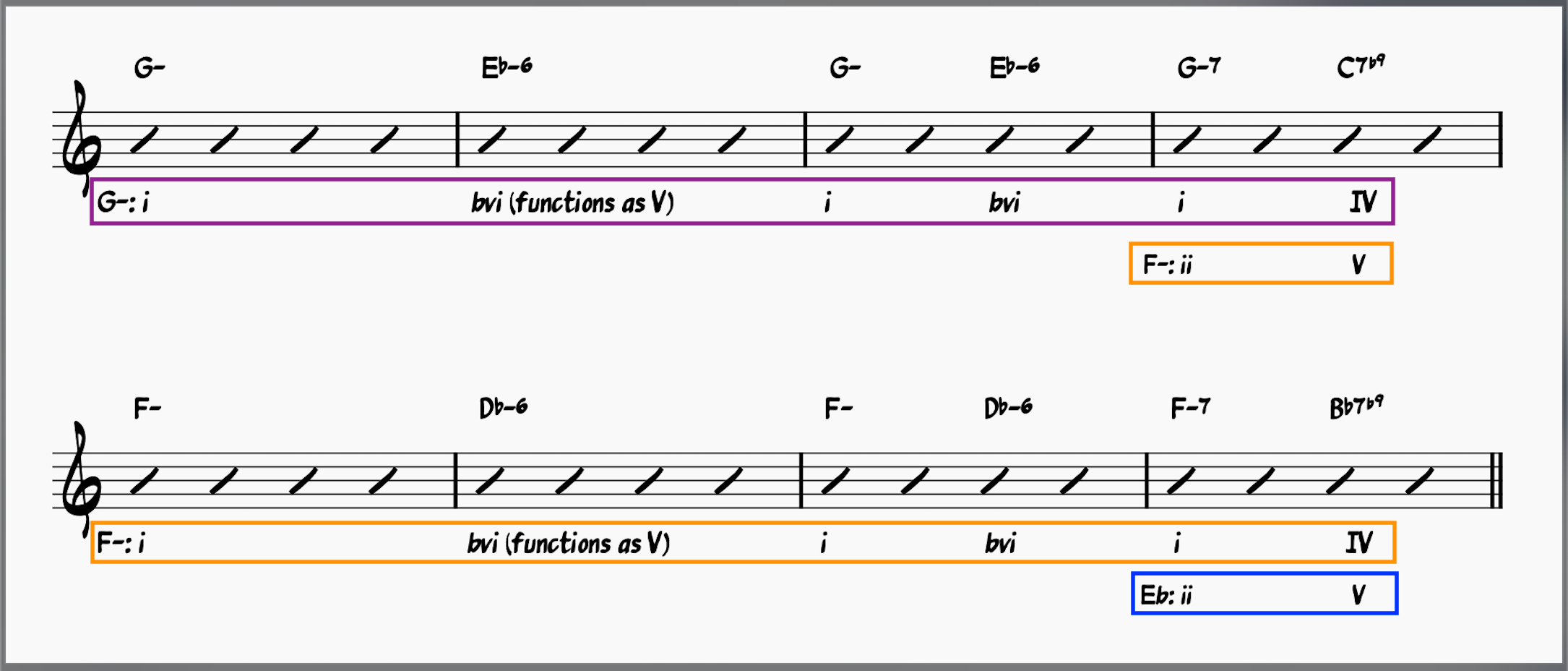
Check out this beautiful version of Dindi by Astrud Gilberto:
6. Vou Te Contar (Wave)
Wave is a beautiful Antonio Carlos Jobim Bossa Nova song featuring a twelve-bar A section that has some bluesy qualities and rich Bossa Nova chords.
The A section starts in the key of D major with a Dmaj7 chord. The Bb°7 chord functions like a dominant chord (A7b9) and changes to an A-7 chord, which is a minor v chord in the key of D.

However, like any good blues, we are temporarily moving to the IV (G major) in the second system, so we can also see this change as a ii, which moves to a V chord (D7b9).

From Gmaj7, we move to a minor IV chord before playing a series of secondary dominants to take us back to the tonal center. These dominant chords make a classic III – VI – II – (bVI) V chord progression.
![6 Bossa Nova Chord Progressions You Need to Know! 25 Bossa Nova Chord Progressions: [III - VI - II - V] in the A section of Wave](https://images.surferseo.art/1d352f14-f0f0-426a-a92a-731435a1ff93.png)
However, instead of resolving to a D major chord, we resolve to a D-7 chord and play a ii-V figure in the key of C. This is an example of borrowed harmony or modal interchange. Here, we are borrowing from D Dorian.
Here is the entire A section:
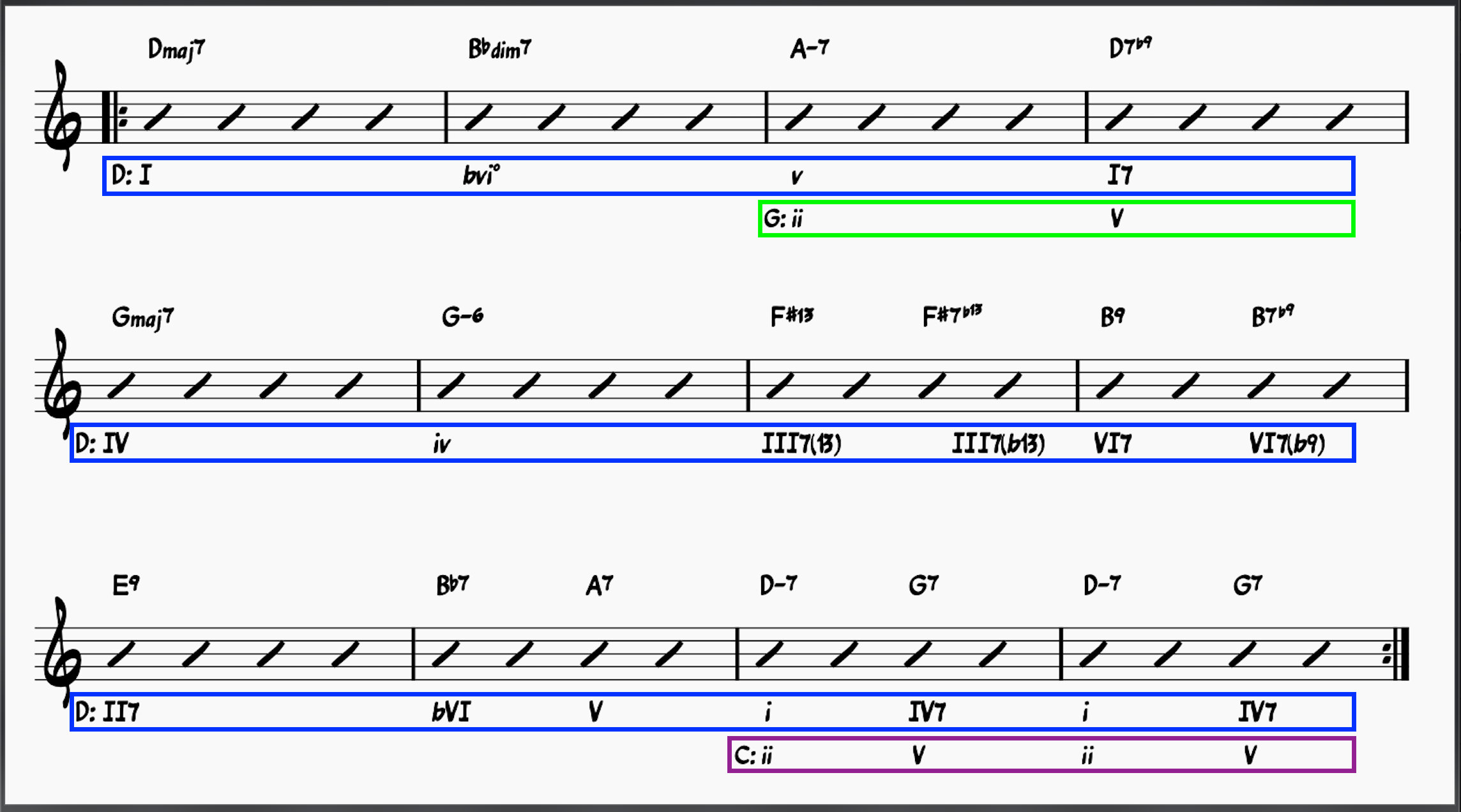
Check out a classic version of the tune Wave to hear this Bossa Nova chord progression in action:
For more on jazz chord progressions, check out this article on nice jazz chord progressions you need to know!
Take Your Bossa Nova Playing to New Heights. Join the Learn Jazz Standards Inner Circle!
Truly internalizing Bossa Nova chord progressions requires a careful study of the recordings and compositions of great Bossa Nova tunes. If you want to take your musical abilities to the next level and master jazz subgenres like Bossa Nova, then you need to check out the Learn Jazz Standards Inner Circle.
We have everything you need to take your jazz playing to the next level.
Want to improve in 30 days or less? Check out what the Inner Circle has to Offer.




